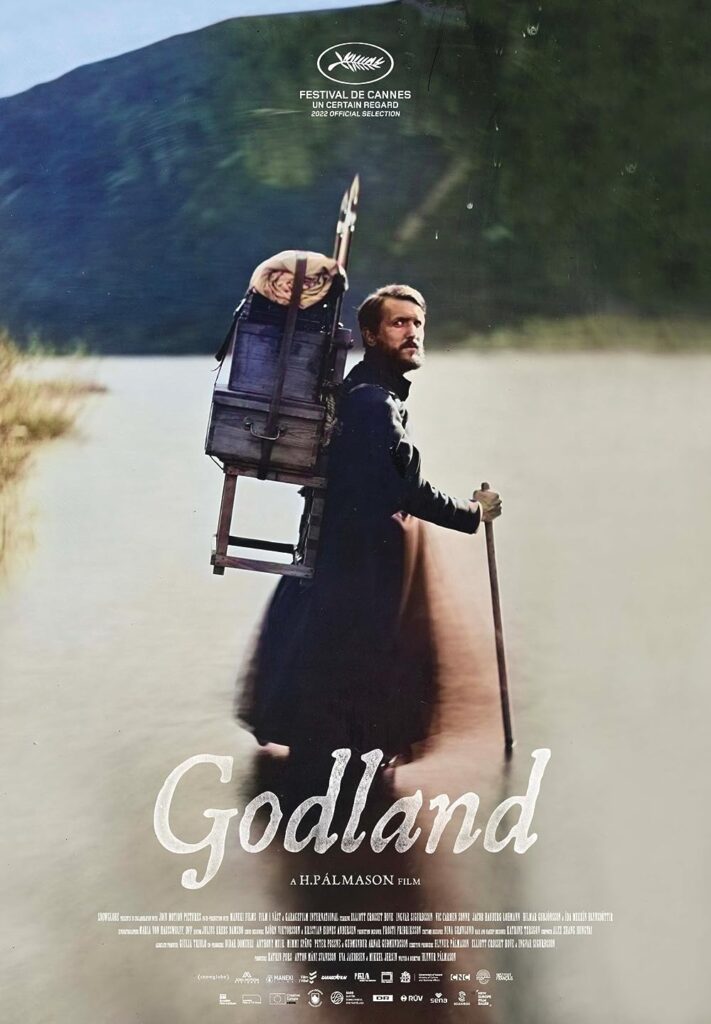Godland
Introduction
The Oscar season is slowing warming up and here I am on a quest to cover all the Oscar nominated films under the ‘Foreign Film’ category this year. With that, I finished watching the Icelandic film ‘Godland’ that marks Iceland’s Official Submission to the Academy Awards this year. While the film had premiered at the Cannes Film Festival last year, the fact that it still made it to the Top 15 this year was quite an achievement, a feat that prompted me to prioritize the film further. We have all been witness to religious thrillers or dramas that usually revolve around a particular incident, often questioning the faith and morality of characters. And Godland seemed to be one of the films from that genre, does it manage impress though, let’s find out.
Story & Screenplay
Set in the 19th Century, Godland follows the story of a young priest as he is assigned a task of constructing a church in Iceland(occupied by Denmark then), and at each step his faith is challenged in one form or the other. The story here is not your usual religious drama with the standard tropes associated to it. Instead, the makers coax you to be a ‘silent’ observer, observing the characters, their traits and the ever changing landscapes while presenting an abstract case of faith and the challenges that it brings with it. The screenplay standing at 140 odd minutes unfolds at a leisurely pace almost allowing the viewers to be silent spectators with the group who travel through adverse conditions thereby making for a compelling watch. Yet at its core, the drama is a fascinating character study featuring different characters and their shifting ambitions which are reactive as per the situation or with respect to other characters around them.
The drama sets the context pretty early on with the introduction of the protagonist who is instructed by a senior priest in Denmark to pave his way to Iceland to construct a church while also being told to adapt to the locals for the same. The camera pans to a couple of lines that tell the viewers a couple of photographs that were retrieved from the era with the story forming a fictional account around the event. The journey though continues but what fascinated me instantly was the resolution of the film being shot in 1.33:1 aspect ratio which was a homage to the camera used by the protagonist to document his journey, and the people around him. And he captures his journey through the bandwagon of helpers whom he meets including his translator, and his guide who has a disdain for the Danes. But it is the topography of the region that poses the first conflict of the drama through its beautiful terrains marred by extreme weather.
The proceedings are almost meditative allowing the viewers to imbibe the vibe of the surroundings without completely making things obvious. So in the beginning the faith of the characters is challenged by the landscape that also sees the death of one of the characters while causing the protagonist to be fatally ill. His thoughts of ‘God Isn’t Needed’ or ‘God hasn’t helped him'(paraphrased) acts as a crucial turning point in the drama. The protagonist Lucas was always an arrogant man masking his arrogance with his faith. But the moment his faith took a beating, his real traits was exposed which were further strengthened after he survives the extreme conditions thereby allowing himself to believe that he was a body of authority.
The drama also highlights the different cultures of Denmark and Iceland, with the later having being colonized then. And both these countries are presented by two characters, the protagonist and his guide who have an underlying layer of tension brewing between them. The latter is a man of extreme faith, perhaps even more than the protagonist who is a priest, while suddenly being reduced to a helper who is often instructed of the activities to be carried out as opposed to being ‘one amongst the group’. The power center does shift towards the protagonist as he also finds himself the love of his life much to the dismay of another character who was welcoming but suddenly has seeds of distrust sown against him.
In all of it, the beautiful landscape of Iceland is subjected to some beautiful 360 degree shots featuring a shifting timeline while focusing on dead bodies being dissolved to rubble across various seasons. What I did make of it also was that the landscape was like the mind of various characters who would like to believe their faith but are also revengeful in many ways. Yet, the idea of being reduced to rubble irrespective of being an authority or the one colonized was essentially the crux of the drama that did touch upon various sins of characters along the way in a beautifully penned screenplay that is challenging in many ways. The title at the end represented in Danish and Icelandic languages does stay with you for neither of them directly contribute to it being ‘Godland’.
Dialogues, Music & Direction
The dialogues represent the two cultures of Denmark and Iceland while also highlighting language as a barrier for most characters, thereby challenging their faith(do you see a pattern? Anything out of the ordinary for a character does challenge their faith). The BGM is mostly reduced to natural sounds and that adds a whole new layer of authenticity to the drama. The cinematography is beautiful capturing multiple wide shots of the terrain with such finesse while reducing its beauty intentionally with a compressed aspect ratio that is also reflective of the narrowed thinking of the characters without seeing the larger picture. The editing is pretty good allowing the frames to flow without any jump cuts. Director Hlynur Pálmason is an expert of allowing the drama to flow while trusting the intellectual abilities of the viewers to decipher the drama. He does not believe in spoon-feeding the viewers with the events while doing just enough to capture your complete attention in the most subtle manner possible. The direction is excellent here while presenting a very unique picture of religion and its associated faith.
Performances
The performances are excellent here by the ensemble cast. Ida Mekkin Hlynsdottir as Ida represents the innocence of a young mind who is slowly observing the events around her and she was phenomenal here. Jacob Ulrik Lohmann as Carl is wonderfully restrained in a character that keeps his feelings close to his chest. Vic Carmen Sonne as Anna represents desire from a religious point of view and her body language and antics were subtle and brilliant. Also her screen presence was simply emaculate. Ingvar Sigurôsson as Ragnar is outstanding while highlighting the beliefs of his imperfect character to perfection. Elliot Crosset Hove as Lucas is brilliant to the core in a character that allows his materialistic pleasures to transform him and take a step away from his faith. Karma depicted through his character was pretty interesting to watch as well.
Conclusion
Iceland’s Official Entry to the Academy Awards this year, Godland is a meditative drama highlighting the complexities of faith and morality that makes for an excellent watch and Highly Recommended from my end.




